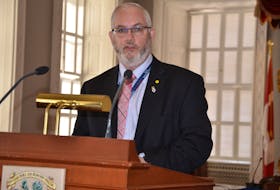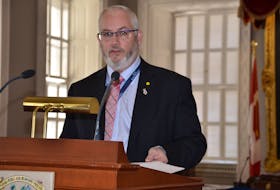Although it has been a busy summer of teaching, research and community service projects, I was happy to be able to find time to read Michael Massing’s splendid 2018 book, "Fatal Discord: Erasmus, Luther, and the Fight for the Western Mind".
If you are looking for a reading suggestion, please don’t be intimidated by the 1,000 pages. This book is like an enthralling course covering many subjects, combined with the thrill of an action novel. It’s lively and accessible to a wide audience.
The world of the 1500s parallels our own time in some important ways: unsettling plagues, but also exciting new ideas and insights. New printing presses and upstart publishers were spreading ideas with speed and efficiency.
The first half of the 16th century also saw the rise or resurfacing of prejudices, attempts to correct obscene abuses of power, growing demands to redistribute wealth and power, and the emergence of strange and fanatical leaders.
Those were restless and increasingly violent times.
There was so much possibility and so much peril. Political and moral earthquakes were happening in quick succession. The people of those times were faced with major forks in the road.
Massing’s sweeping book is held together by the dramatic lives of two critical thinkers and celebrities: Desiderius Erasmus Roterodamus (or simply Erasmus) and Martin Luther.
Dutchman Erasmus, who died in 1536, and the German Luther, who died in 1546, were contemporaries: They publicly corresponded with each other. They were the European intellectual leaders of their time.
But the divisions between them grew with each passing month.
The monk Luther started out to reform the church, with its corrupt-at-the-core popes, its hoarding of wealth and its fear of letting people read scripture or other books, or to think for themselves.
Luther was bold in standing his ground, even when vilified and excommunicated.
The world of the 1500s parallels our own time in some important ways: unsettling plagues, but also exciting new ideas and insights.
Luther’s moves prompted millions of people to also feel politically liberated, to form new movements and to demand economic justice. The implications were profound.
He started out by making many overdue, valid points. But he became more cruel and more narrow.
Having pushed aside one form of domination, Luther became a defender of oppressive political leaders, provided they agreed with him. When impoverished peasants, invoking Luther’s own ideas, mobilized to put a stop to the greedy enclosure of common lands and to the system of serfdom, Luther sided not with them but with the repressive regimes, explicitly justifying mass slaughter and torture of the poorest in society.
Meanwhile, Luther’s anti-Semitism became even more rabid as he aged.
Like Luther, Erasmus was horrified by abuse of power and manipulation of religion. Both men visited Rome in person and were appalled by what they saw there.
But Erasmus, more than Luther, was known as a “Christian humanist.” He combined ideas of individual freedom with a respect for community and human dignity. He had a broad and generous understanding of spirituality and citizenship. Erasmus thought we all have a free will to do good; Luther minimized that notion.
Erasmus opposed war and execution. He called for reforms in government and doctrines, but thought it was possible to work within existing structures in order to reshape those structures.
Luther condemned and insulted Erasmus as a sell-out and a coward for tiptoeing around the powerful. But Erasmus was a moderate at heart. He remained a Roman Catholic, albeit a progressive one. Catholic hard-liners hated his big-tent approach almost as much as the Protestant Luther did.
Erasmus found it harder and harder to actually reside anywhere. He was squeezed out by hard-line conservatives and no-compromise revolutionaries.
After his death, Erasmus’s ideas faded into the shadows as the extremists on both sides gained more ground and Europe plunged into seemingly endless wars.
Only after the Second World War did Erasmus’s ideas really resume their influence. The European Union has clear Erasmian overtones, as do ideas of global citizenship, pluralism and rights that transcend boundaries. The grateful EU even has an Erasmus Program, a study-anywhere program for European students.
But Erasmus is fading again. Walls are going up. Hatemongers are coming out of their basements. Moderates are told that there are only two sides, and they must pick one. Scholarship and science are spurned by “alternative facts.”
The book Fatal Discord is a warning from history – a warning to hold the ship steady but not frozen, a warning against permanent walls, a warning to listen to the grievances of the oppressed and make changes before it’s too late. It’s also a warning that hate-filled tracts can find unhinged audiences and that acts of violence can have disastrous consequences for generations.
We’re at a fork in the road.
Dr. Tom Urbaniak is a professor of political science and director of the Tompkins Institute at Cape Breton University.









